Parents, educators say some children with speech issues may have been hurt by masks
Sabrina Chacon was relieved that her son Matthew, a Ho-Ho-Kus School District third grader, would receive speech therapy in person, after months of virtual sessions during the pandemic.
Matthew had interacted with his therapist using a computer as he worked to articulate words and letter sounds on screen in fall 2020, before vaccinations were available.
Then came spring.
To her dismay, Chacon learned her son and the therapist would be wearing masks during the much-needed in-person speech therapy her son would receive and had received since preschool.
“It just never occurred to me that they were doing masked speech therapy,” she said.
Chacon chose virtual speech therapy for the first months of the pandemic so her son could make full use of the few hours school was open to socialize with his classmates. She said she wanted normalcy for him during an already disorienting time.
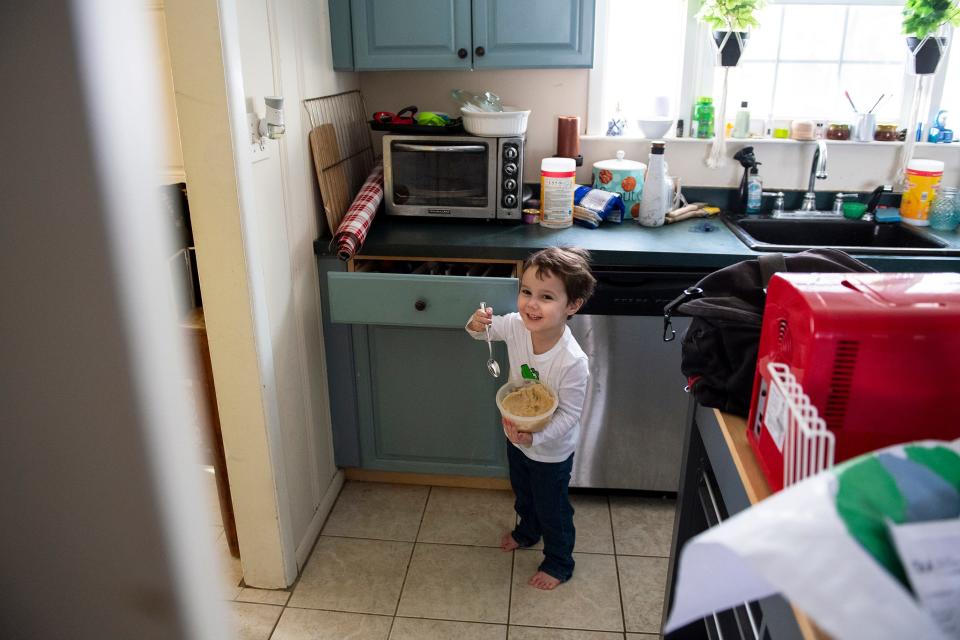
A cheerful child who speaks with fluency and loves making his friends laugh, Matthew Chacon needs therapy because he was speech-delayed in preschool and has a condition called dysgraphia, a learning disability that affects writing.
He also struggles with word and sound articulation — which requires him to see lip movement, impossible through a mask. The school ordered clear-plastic masks, but those tend to fog up and gave the 9-year-old headaches, his mother said.
“He said he would drool more, it gave him a headache, he couldn’t focus,” Chacon said.
The losses suffered from masked speech therapy for children with speech and language-related disabilities have not been accurately measured or studied, at least partly because school mask mandates are still in place in many states. Families and a small community of pediatricians and speech pathologists are left to bring attention to the situation, from what they see and from their deep knowledge about their children’s specific needs. The Centers for Disease Control and Prevention and the American Academy of Pediatrics have advocated universal masking indoors in schools since spring 2020.
New Jersey will lift its school mask mandate on March 7. It will be left to individual school districts to decide whether they want to continue imposing mask requirements or make them optional. So far, the state's largest district, Newark, has opted to keep the mandate in place, though most districts have indicated that masks will no longer be compulsory.
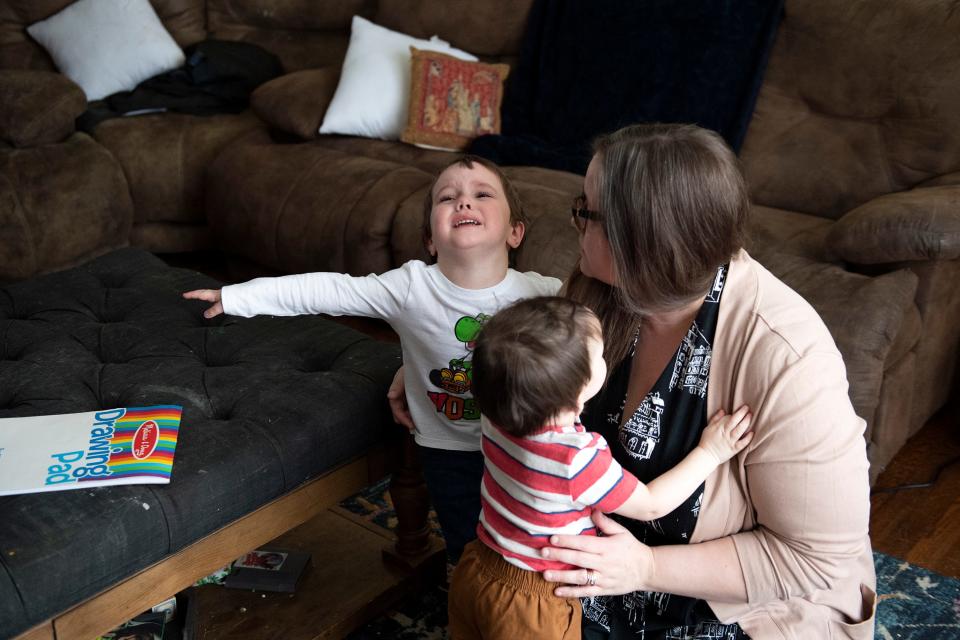
Burlington County resident Katharine Hart’s two preschoolers have never known a world without the pandemic.
The pandemic has been a constant, uninvited third party in her two young children’s lives — as hard as she and her husband have tried to make things "normal." Normalcy, for Hart, also means that her severely speech-delayed 3-year-old should be permitted to attend the three hours of preschool in the Medford Lakes School District without a mask and remain maskless during speech therapy.
Mask mandate lifted: Murphy lifting mask mandate in NJ schools. Here's what parents, educators say
The isolation and exclusion of the early months of the pandemic affected her son, who was 18 months old when it began, Hart said. This is worsened by his two speech- and communication-related delays. Hart, who did not wish her son's name to be published, said he is unable to wear a mask because he cannot cognitively understand why it is needed. She’s concerned that forcing him to wear a mask might worsen his already delayed language skills, especially because he cannot communicate his feelings with words.
“My son has three words: Mom, fast and no,” she said.
“He was 18 months old when lockdowns and shutdowns began,” she said. “This has been for over half of his life he’s been either isolated or I’ve attempted to put a mask on him, and he’s been kept out of things because he cannot wear a mask.”
Hart, who has a doctorate in education and teaches English language to eighth graders in a Trenton public school, was the sole earner during the early months of the pandemic, when her husband was laid off from his restaurant job.
Raising the issue of masks for children with disabilities was taboo during the early pandemic, said Hart, who is not vaccinated, but said she has complied fully with testing and mask mandates that are required for unvaccinated personnel in public schools. She caught COVID in December and has since recovered.
Sabrina Chacon and her husband are fully vaccinated.
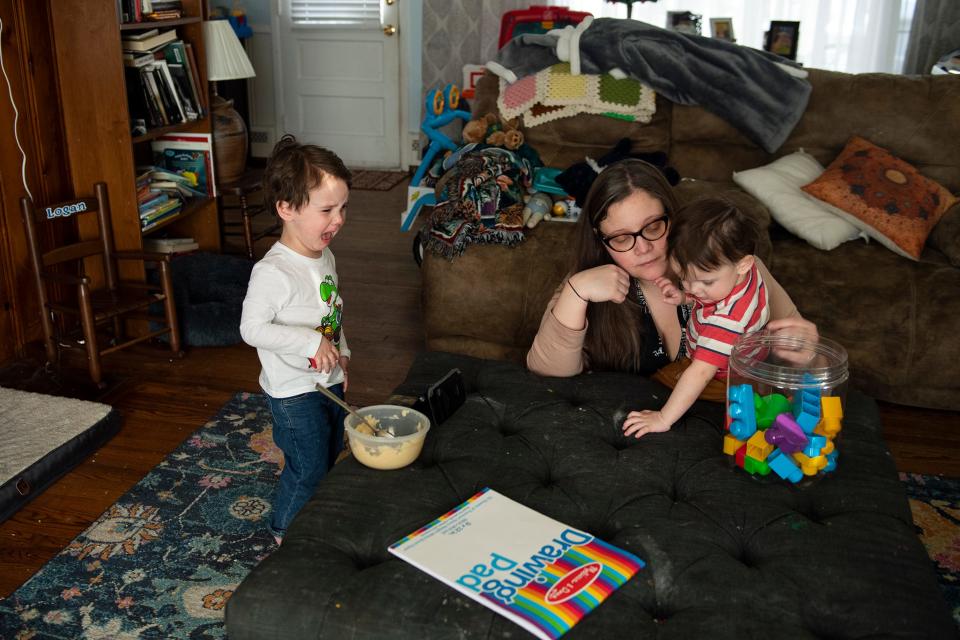
"If you were speaking out about this early on, you were called an anti-vaxxer, anti-masker, anti-science, why don't you believe? It's not that I don't believe it, it's that I think it's not right. People were just not in a space to hear that or talk about it," she said.
The Medford Lakes School District agreed to let Hart’s son receive speech therapy without a mask, but denied permission for him to go without a mask in his preschool classroom. Though he was eligible to start school in September, Hart said she refused to send him until he could be exempted from mask-wearing entirely. She has letters from two doctors supporting her request to let him attend without a mask.
Mask exceptions ignored
Both Matthew Chacon and Hart’s child have Individualized Education Plans approved by the district. IEPs are state-approved learning programs designed for children needing additional support because of a learning delay or disability. Matthew’s IEP notes that his development was impeded by remote learning and having to wear masks.
Children with disabilities are required to wear face coverings, the state Department of Education said in "The Road Forward," its guidelines for schools during the pandemic. The guidance clarifies expectations for these children, saying parents who are concerned that their children are unable to wear masks should provide supporting medical documentation to their schools.
COVID vaccine: Nearly 2 of 3 NJ kids have not received COVID vaccine as Murphy plans to drop masks in schools
Hart said she first tried to get an exemption for her son by asking the school to add the medical advice that she received against wearing masks to his IEP, to provide grounds to exempt him from having to wear them.
Gov. Phil Murphy’s executive order mandating masks in school has a list of exceptions for situations when children may be permitted not to wear a mask. That list includes children whose developmental disabilities listed in their IEPs “preclude” them from wearing masks.
After her attempts to convince the school to let her son be excused from the school mask mandate requirement failed, Hart reached out to the state's special education ombudsman and filed a lawsuit for emergency relief for her son, asking that his IEP be amended to include a mask exemption. The lawsuit argues that her son is being denied access to the education he rightfully deserves because of a mask requirement with which he is not able to comply.
The hearing is scheduled for Monday at 9:30 a.m.
Hart said she is not disputing the mask mandate, and took legal action to be able to work according to its rules, which she said discriminate against her son.
“I do feel like he is in harm’s way because he is falling further behind as adults want to play these games," Hart said. "I’m not even seeking to overturn the mandate. I am legitimately working within it, and still getting nowhere.”
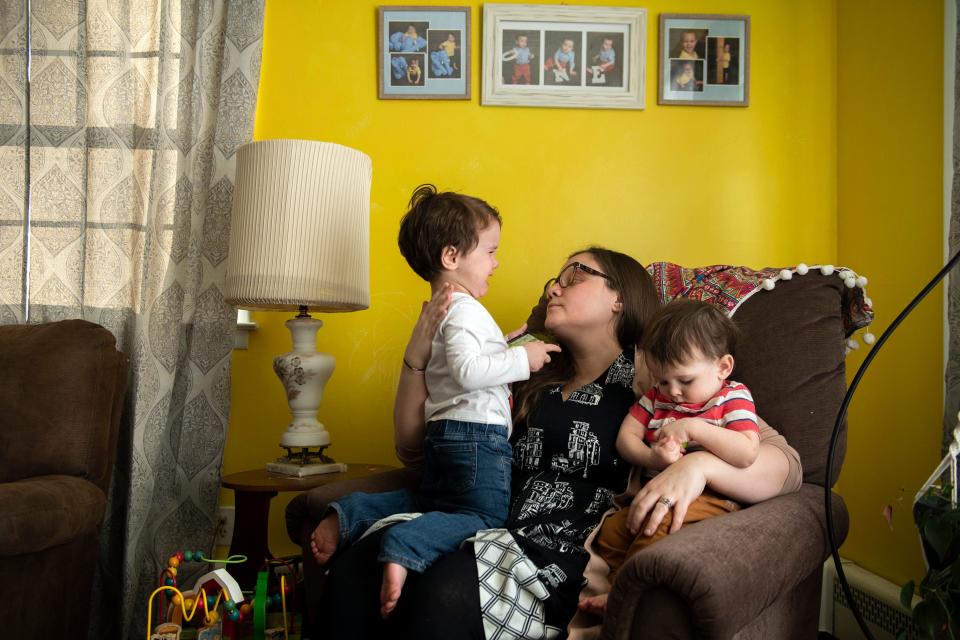
But how schools interpret the mandate and its exceptions vary. Matthew Chacon does not have permission to be maskless during speech therapy, but Hart’s son does. And parents have sued for their children’s right to public education on grounds that are the opposite of Hart’s lawsuit.
In states where governors have banned mask mandates, some parents of children who have IEPs have brought disability discrimination claims on the grounds that exposure to the virus from unmasked children makes it unsafe for them to be in school. Special education attorney Thomas O’Leary said some courts have ruled in favor of those parents.
“If a school district removes a mask mandate and you have a kid who is medically compromised that can’t access his or her education because no one is wearing a mask, that’s a violation of federal law,” said O’Leary.
Removing mask requirements can expose schools to lawsuits, but so can requiring them.
The Medford Lakes School District did not respond to emails and phone calls asking for comment on Hart’s situation.
The New Jersey school mask mandate also makes an exception for children playing vigorous sports or musical instruments and while they eat.
"The order never mentions speech therapy or any remedial instruction during which masks might obstruct progress," said Chacon. By doing so, she said, it ignores children who need these interventions for their disabilities.
Ho-Ho-Kus Schools Superintendent Diane Mardy responded to a request for comment on the Chacon family’s request in an email. She wrote that the pandemic has been “particularly challenging” for children with speech and language delays and that the school has accommodated their needs “while at the same time protecting the health and safety of all our students.”
Other viewpoints
Concern about the health and safety of all, over and above the needs of individual children, has also been the approach of the nation’s leading professional and certification organization for people who work in speech and language therapy.
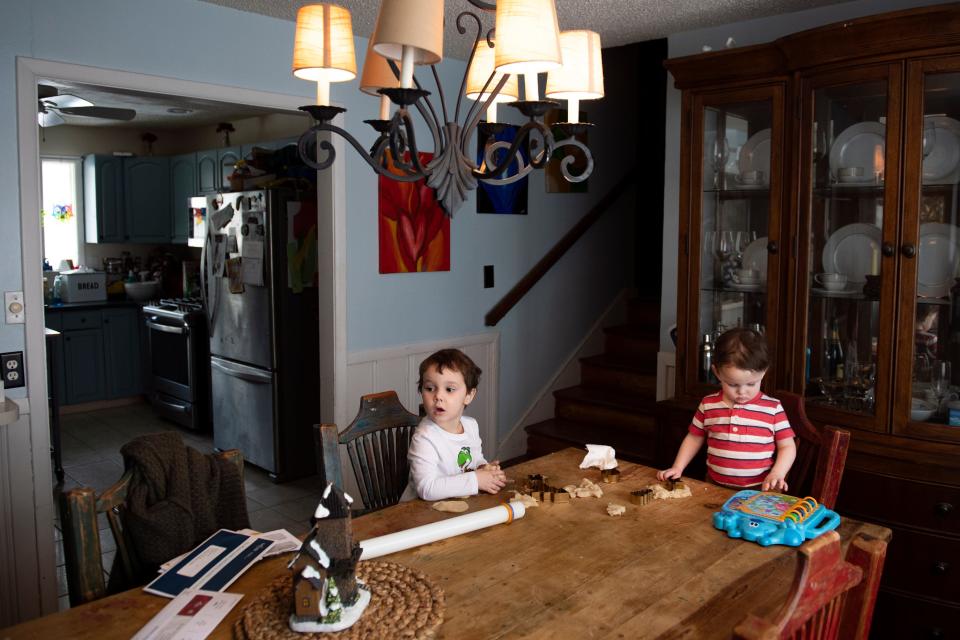
“Neither the CDC nor the AAP list communication differences or impairments as reasons to exempt children or adults from wearing masks,” said Diane Paul, senior director of the American Speech-Language-Hearing Association (ASHA). The organization follows CDC guidance and local and state mask mandates, said Paul, to reduce infection and keep children in school. Asked if the organization might change its position as the omicron surge wanes and infections decrease, She said ASHA would continue to adhere to this policy.
“We are aware that people are concerned about a possible link to speech and language development,” Paul said. Teachers can use strategies to mitigate negative effects of masks, she said, and the organization advises its members against giving mask exemptions.
Economic disparity
Mask exemptions refer to doctors' notes asking that a child be excused from wearing a mask, like the two letters Hart gave to her son’s school district. However, school officials and superintendents eventually make those decisions. When exemptions are denied, wealthier parents have the option of hiring private therapists who will work without masks, while low-income families are left to make do.
“I do write mask exemptions for those parents when they ask me,” pediatrician Dr. Kristen Walsh said about the families of some vulnerable children she treats at a North Jersey hospital. “My low-income parents of autistic kids just became desperate. They were at their wits' end, asking me when I thought the mandate would end.”
Walsh said the ideal scenario for speech therapy is that it be in person and without any masks, pointing to countries where masking was not universally required in school. The United Kingdom practiced this during the delta surge of the pandemic, when elementary children were never masked and without any clear indication that schools increased virus spread.
Walsh is part of a team of doctors who have advocated independently that schools become mask-optional and all restrictions be lifted, now that vaccinations are available and the omicron surge has ended. An Early Childhood Champion for the AAP in New Jersey since 2012, Walsh said she “respectfully disagrees” with the pediatric group on its adherence to universal masking.
“Masks definitely have their place in medical settings, maybe with nursing home workers ... but they do so much harm with children.” Where therapists have the option to be alone with children, Walsh suggested 6 feet distancing and ventilation.
“We can’t make [6 feet] distancing practical schoolwide, because then nobody’s going to go to school, but in those settings where you’re working closely with a child, to have a well-ventilated room and if you have any concerns, keep a 6-foot distance. Those would be the first two mitigations that make the most sense.”
Multiple studies conducted early in the pandemic showed that minority and low-income children experienced the most unfinished learning in the early grades — and the federal government has distributed $122 billion from the American Rescue Plan to aid K-12 schools in recovering from it. As far back as June, the Department of Education said children with disabilities faced even greater gaps in academic achievement during the pandemic because they were already at a disadvantage compared with their peers.
There were 227,963 children last year in New Jersey’s public schools from ages 3 to 21 classified as needing special education services because of their disabilities, according to data published by the state. They make up nearly 17% of children enrolled.
In this group, around 1% are preschoolers and 3.5% are speech- and language-impaired. About 1.7% of the children are autistic, with the largest group, at 5%, children with “specific learning disabilities.” Communication-related delays extend across these children.
The only time a speech therapy student is unmasked is when preschoolers make the transition from home to school and staff work with them to keep their masks on. Children with disabilities struggle far more to adapt to masks. An educator who asked not to be named said he reported the case of an autistic child who was chewing and eating the surgical mask. The school replaced it with a cloth mask a few weeks later, but the child continued to chew it.
At a time when terms like "mask fatigue" have entered the lexicon, parents of young children born during the pandemic were introduced to terms like “mask training” and “mask defiance.” A parent who did not want to be named said that even well-intentioned staff in preschools use these as catchall terms to explain how to acclimatize children to wearing masks for the length of a school day.
Broader impacts
Children with special needs can grow attached to their masks or depend on them in unhealthy ways, said Gabriel Haller, a pediatric occupational therapist in private practice in Highland Park who also provides services to children between 6 months and 3 years old in the state-run early intervention program and at a North Jersey elementary public schools. He teaches functional communication skills, a key focus area for children who need help expressing basic needs and feelings.
Haller said he worked with a 5-year-old autistic and non-verbal child who was afraid to lower the mask even for a few seconds when Haller tried to see if he could make certain sounds correctly. “He would immediately pull it back up. He’s unable to understand, at this point, that you’re not supposed to be wearing a mask,” Haller said.
Substantive studies on the impact of masking on speech development among very young children are hard to come by, as many communities are only beginning to transition out of mandatory mask-wearing.
Some students' IEPs may not have been updated from when schools reopened in late spring last year.
“A lot of children are not meeting their goals," Haller said. "I expect for a lot of the preschoolers that I work with to have more language by now, and they don’t.” He said he expects this to be worse in urban and low-income districts.
Masks worn by teachers further impair children with autism, who might tend to look at the speaker’s mouth more than they do the eyes, Haller said. Children with hearing and auditory-processing disabilities also tend to focus on parts of the face other than the eyes.
“My colleagues and I are noticing a lot more referrals of children with poor eye contact. I think that’s because the face just doesn’t seem interesting anymore when you occlude half of it. … I used to have a lot of children with autism who used to more or less look at my face somewhat. But now I’m having a lot of difficulty even just trying to direct them towards my face,” he said.
Plexiglass separators have helped Catherine Fredericks, a speech and language pathologist who teaches preschoolers and elementary children in Wayne. She said she sometimes lowers her mask from behind the separators and speaks over the loud hum of air scrubbers installed in classrooms to mitigate the virus. When the weather is good, she goes outside with her students, though some educators say children have trouble focusing when they are outdoors.
Fredericks agrees that clear-plastic masks are "less than ideal," but she does not think masks have inhibited progress in general.
“My children are all wearing masks. Sometimes they’re under their nose; sometimes they’re over their nose. Sometimes they sneeze into them and we have to go find a new one," she said. "Is this ideal? Is this something we want to continue forever? Absolutely not. But in spite of all of that, children have made progress.”
Even autistic children, she said, benefited from virtual therapy because many of them enjoy technology. And the key factor she said, was that parents were able to join their children during sessions, which aided the process.
For low-income and working families, support from parents during virtual school was not always possible or even feasible.
Chacon said her son Matthew has progressed despite restrictions. She said this was because of support that has been available throughout his life, from the school and his family. Ho-Ho-Kus' student population is 81% white, and no students are facing poverty, according to school data from 2019.
Wayne, where Fredericks teaches, is 71% white and 10% of its students come from economically disadvantaged homes. Some of the children described by Haller come from starkly different demographic backgrounds and income levels, including a district whose students are mostly low-income and Hispanic or Black.
Generalizations about the detriments of masked speech therapy aren’t necessarily true, said Fredericks, but she said she “absolutely believes” individual parents who raise concerns for their children — like Hart and Chacon.
“I would ask people to realize that there is more than one perspective,” Fredericks said. “Basically what it comes down to is you advocate for the needs of your individual child. And that is the most important thing, as a parent.”
Mary Ann Koruth covers education for NorthJersey.com. To get unlimited access to the latest news about New Jersey's schools and how it affects your children, please subscribe or activate your digital account today.
Email: koruthm@northjersey.com
Twitter: @MaryAnnKoruth
This article originally appeared on NorthJersey.com: Do masks cause speech delays? Some parents say yes.
